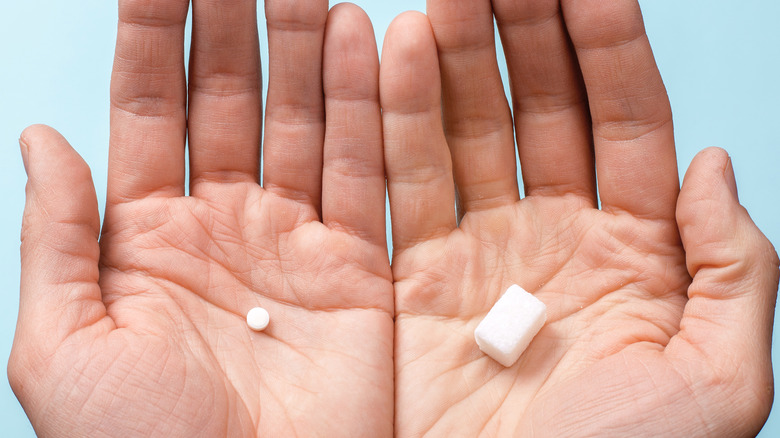Artificial Sweeteners Vs Sugar: Which One Is Worse For You?
If you have ever found yourself struggling to decide what type of sweetener to use, you are not alone. Besides sugar, there are countless artificial sweeteners, but which one is better for your health?
When it comes to artificial sweeteners, there are plenty to choose from. For those trying to cut calories, they seem like a logical choice, but research suggests that they are not without risks. While sugar substitutes might reduce your caloric intake on a daily basis, there is no evidence to show they actually help long-term weight loss, In fact, because they are so sweet, they might cause some people to eat more sweet foods (via Harvard Health Publishing).
In addition, a study published in the Canadian Medical Association Journal linked low-calorie sweeteners, such as aspartame and sucralose, to diabetes, high blood pressure, and heart problems. Another study found artificial sweeteners to increase the risk of dementia and stroke.
Too much sugar increases certain health risks
Sugar is not much better when it comes to health risks. Studies have linked the consumption of too much sugar with heart disease, type 2 diabetes, kidney disease, gout, cancer, and tooth decay. It also takes a toll on your cells. High levels of sugar can increase cellular aging as well as age the skin (via Healthline).
In addition, excess sugar has been associated with obesity and inflammation, and both of these conditions increase your risk of developing certain kinds of cancer. Chronic inflammation can lead to depression, anxiety, fatigue, and digestive issues (via Medical News Today).
If you are trying to reduce the amount of sugar you consume, the U.S. Food and Drug Administration suggests limiting calories from added sugar to 10% of the total number of calories consumed. If you want to eliminate sugar and sugar substitutes from your life, try reaching for a piece of fruit to satisfy a sweet craving. You get a sweet taste from sugar in a natural form, plus the added benefit from nutrients and fiber your body needs (via Mayo Clinic).


